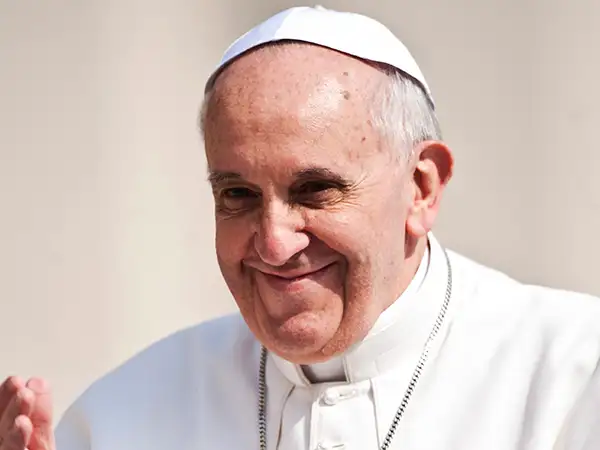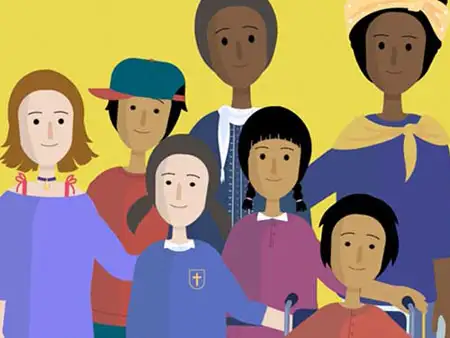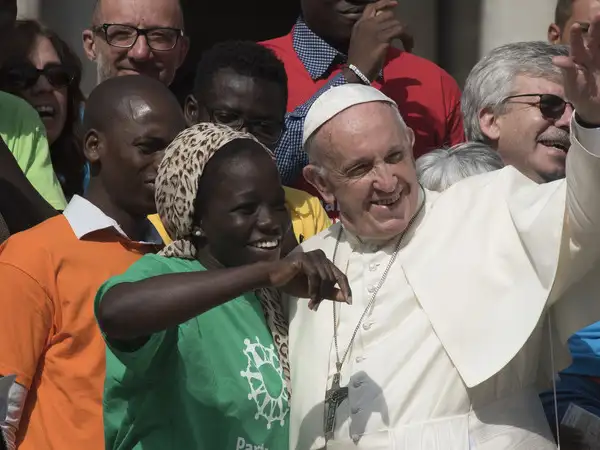An animation for schools on Pope Francis' encyclical, Fratelli Tutti.


Pope Francis.
The Vatican released the much-anticipated encyclical by Pope Francis, Fratelli Tutti on 4 October 2020, the feast of Saint Francis of Assisi. This Q&A includes an encyclical definition and a look at what Pope Francis’ encyclical means for the world we hope to see.
1. What is an encyclical?
An encyclical is a letter circulated by the Pope to Catholic churches worldwide. It is sent directly from our Holy Father in Rome to Catholics all over the world and is often addressed to all people of good will, namely non-Catholics who may also want to read the document. Pope Francis' encyclical Fratelli Tutti is addressed to “brothers and sisters all (8)”
Papal encyclicals provide analysis, in the light of the Gospel and of the Tradition of the Church, on relevant issues for the faithful. Previous popes have issued encyclicals on a variety of topics, from the study of Scripture (Leo XIII, 1893) to humanity's redemption in Christ and the dignity of human beings (John Paul II, 1979).
From 1891 onwards, many encyclicals were issued as responses to questions raised by social movements and calls for societal change. For example, the struggles of workers during the industrial revolution (Leo XIII, 1891), the need for peace in the post-World War II era (John XXIII, 1963) and the global financial crisis (Benedict XVI, 2009). These later encyclicals are part of what is known as Catholic Social Teaching documents.
2. The encyclical was released on the feast day of Saint Francis. Who was Saint Francis?
Saint Francis was born in Assisi in the late twelfth century. He is the patron saint of ecology and, with Catherine of Sienna, the patron saint of Italy. Together with Saint Clare, he founded several orders of women and men religious, including the official Franciscan Order, the Poor Clares and the Third Order of Brothers and Sisters of Penance (now known as the Secular Franciscans), composed of lay people and clergy, who neither lived apart nor took religious vows, but chose to live out Franciscan principles in their daily life.
Saint Francis is most known for finding God in poverty and simplicity, in contemplation and in work, as well as in the natural environment, seeking friendship with all God’s creatures. He is often depicted surrounded by birds and wild animals wearing the coarse woollen tunic worn by the poor peasants of his native Umbria. As the pope puts it in Fratelli Tutti, “Wherever he went, he sowed seeds of peace and walked alongside the poor, the abandoned, the infirm and the outcast, the least of his brothers and sisters” (FT, 2).
One of Pope Francis major inspirations for this new encyclical was the episode in which Saint Francis visited Sultan Malik-el-Kamil, in Egypt, at the time of the crusades, as an effort to end conflict between Christians and Muslims. This is offered as a model of Christian love, which the "poor man of Assisi" lived out also in his homeland. As the pope puts it, “In the world of that time, bristling with watchtowers and defensive walls, cities were a theatre of brutal wars between powerful families, even as poverty was spreading through the countryside. Yet there Francis was able to welcome true peace into his heart and free himself of the desire to wield power over others” (FT, 4).
Join in a novena to Saint Francis
3. What does Fratelli Tutti mean and why does Pope Francis use this Italian phrase?
Fratelli Tutti means “all brothers and sisters” and is taken from the Admonitions of Saint Francis of Assisi. The Admonitions are principles and guidance for monks who belonged to the religious orders established by Saint Francis. At the beginning of the encyclical, Pope Francis draws our attention to point 25 of the Admonitions, in which Saint Francis “calls for a love that transcends the barriers of geography and distance, and declares blessed all those who love their brother ‘as much when he is far away from him as when he is with him’,” (FT, 1).
The previous two official documents of Catholic social teaching that the pope has issued were also titled in vernacular languages rather than Latin. Laudato Si’ meaning “Praise be to You” in ancient Umbrian, was taken from St Francis of Assisi’s Canticle of the Creatures. Querida Amazonia the title of the exhortation responding to the Pan-Amazon Synod, means “Beloved Amazonia” in Spanish, the language that is common to many of the inhabitants of the Pan-Amazonian territories.
4. Why was this encyclical released at this time?
The pandemic shed greater light on the global problems that Catholic social encyclicals have drawn attention to since 1891. In fact, Pope Francis indicates in Fratelli Tutti that during the time of writing, the coronavirus pandemic “erupted, exposing our false securities.” He goes on, “Aside from the different ways that various countries responded to the crisis, their inability to work together became quite evident. For all our hyper-connectivity, we witnessed a fragmentation that made it more difficult to resolve problems that affect us all.” (FT, 7)
The pope, along with the other teaching offices of the Catholic Church (The Dicastery for Promoting Integral Human Development Commission for COVID-19, the Latin American Episcopal Conference, and The Pontifical Academy for Life) all made comment on what the pandemic reveals and how human society could emerge better from the crisis.
Pope Francis’ main way of speaking to Catholics about Catholic social thought as a means of “healing the world” was through his general audiences, delivered every Wednesday of August and September 2020 as part of a Catechesis. He also encouraged all Christians to reflect through the ecumenical Season of Creation. This time of contemplation ended, on the Feast of Saint Francis, with the release of this encyclical, a global call to solidarity addressed to all people.
5. What are the key messages in this encyclical?
Fratelli Tutti is a radical challenge, offering a blueprint for a world after coronavirus. It turns the world upside down, placing human dignity at the centre. And it links back to the message of interconnectedness which was also at the heart of Laudato Si’. As Pope Francis said at the Angelus, just before Fratelli Tutti was released, “The signs of the times clearly show that human fraternity and care of creation form the sole way towards integral development and peace.”
The Gospel story at the heart of Fratelli Tutti is the parable of the Good Samaritan. Jesus’s provocative story of the foreigner who acts as a true neighbour to the man robbed and beaten by the side of the road offers the "criterion for judging every economic, political, social and religious project” (FT, 69). This moves us to respond to our sister or brother in need, whoever they are, wherever they may come from (FT, 72). We are challenged to turn outwards, to act as neighbours, and to reach out to all those who are in need.
Also central to this encyclical is the conviction that love for all brothers and sisters will not shy away from politics. As he insisted in the “Healing the World” Catechesis and Laudato Si’, love is civic and political, not something that is only felt or acted upon amongst friends and families in the private sphere. Love is not only a personal relationship, but should also be at the heart of our political decision-making: “Once more, I appeal for a renewed appreciation of politics as ‘a lofty vocation and one of the highest forms of charity, inasmuch as it seeks the common good’.” (FT, 180)
This encyclical calls for the creation of a new kind of solidarity to tackle the crises the world is currently facing. Pope Francis calls on us all to play our part in building peace, and to focus on becoming a neighbour to others – in particular to welcome migrants, and to resist racism, prejudice and discrimination.
Pope Francis mentions some specific threats to social friendship, peace, and dialogue, such as: political nationalism, racism, trickle-down economics, relativism and consumerist individualism, a lost sense of history and memory, the death penalty, and the development of weapons of war.
Fratelli Tutti calls us to work together to develop a true understanding of progress. At CAFOD, we believe this means moving towards a world where all can flourish and no one is beyond reach of the love and support that they need.
6. Did the pope address the issues in his encyclical to world leaders?
The encyclical is addressed to all people of goodwill, "brothers and sisters, all”. Laudato Si’ addressed all those living on this planet, to draw attention to the common home in which we live. In a similar way Fratelli Tutti invites people to “dream […] as a single human family, as fellow travelers sharing the same flesh, as children of the same earth which is our common home, each of us bringing the richness of his or her beliefs and convictions, each of us with his or her own voice, brothers and sisters all.” (FT, 8).
Addressing us in this way, the pope highlights the global solidarity needed to heal the world of the other sicknesses (social, spiritual, ecological) which the coronavirus pandemic has thrown into sharp relief. So, the encyclical is not only addressed to world leaders, but to all, seeking the inclusion and participation of every person in preparing a better future.
Nevertheless, Fratelli Tutti makes clear that politics is indispensable to the goal of "universal fraternity and social peace” (FT, 176). There is a responsibility on the part of world leaders to demonstrate the virtues that make for a better kind of politics: “Government leaders should be the first to make the sacrifices that foster encounter and to seek convergence on at least some issues. They should be ready to listen to other points of view and to make room for everyone” (FT, 190).
In line with the principle of subsidiarity, however, we don’t have to wait for world leaders and governments to solve the world’s problems: “We should not expect everything from those who govern us, for that would be childish.” (QT, 77). Governments and world leaders are called upon to support the initiatives of more local actors or smaller organisations rather than take-over or absorb them in top-down ways. In an appeal to subsidiarity, the pope notes that “many groups and organizations within civil society help to compensate for the shortcomings of the international community, its lack of coordination in complex situations, its lack of attention to fundamental human rights and to the critical needs of certain groups.” (QT, 175).
Yet, Pope Francis insists that it is the poor who point the way. He is clear that initiatives to tackle poverty are not to be done ‘to’ the poor, but alongside, following their lead. Without programmes that are ‘with’ and ‘of’ the poor (not only ‘for’ the poor),“democracy atrophies, turns into a mere word, a formality; it loses its representative character and becomes disembodied, since it leaves out the people in their daily struggle for dignity, in the building of their future” (FT, 169).
7. Does this encyclical build on his previous encyclical, Laudato Si'?
Some are seeing Fratelli Tutti as part of a trilogy of documents, along with Evangelii Gaudium and Laudato Si’. Evangelii Gaudium called for healing and renewal within the Church, and Laudato Si’ called us to participate in the healing of our common home. Fratelli Tutti says that this healing can only be done together, as sisters and brothers in solidarity and social friendship.
In Fratelli Tutti, we have another Franciscan encyclical to go with Laudato Si’, inspired by the Saint of Assisi and the pope’s namesake. In Laudato Si’ we were warned that not responding to the cry of the earth, with a common plan, would be an injustice to the poor, the first to face the dire consequences of climate change and ecological devastation. Now, we have seen that the poor are also the most vulnerable to the effects of the pandemic. The virus spread around the world through networks of connectedness between human beings and with other creatures, networks that we have taken for granted: “If everything is connected, it is hard to imagine that this global disaster is unrelated to our way of approaching reality, our claim to be absolute masters of our own lives and of all that exists.” (FT, 34).
As in Laudato Si’, in Fratelli Tutti we are once again challenged to create a new future, a new model of progress. Pope Francis sees it as key that this new model of progress is centred on the flourishing of humanity in creation, rather than based on the needs of the economy. This new model of progress should give priority to overcoming hunger and poverty, rather than focusing on creating wealth for those who are already rich.
As he did so in Laudato Si', Pope Francis invites us to look frankly at the crisis we are in and to see an opportunity for transformation: “If only this immense sorrow may not prove useless, but enable us to take a step forward towards a new style of life. If only we might rediscover once for all that we need one another, and that in this way our human family can experience a rebirth, with all its faces, all its hands and all its voices, beyond the walls that we have erected." (FT, 35)
Find out more about Laudato Si'
8. How can the Catholic community respond to this encyclical?
As Catholics we can first of all pray for unity and peaceful dialogue between nations and communities, without which we cannot heal the world after the pandemic.
We may reflect upon how our parish and faith lives have changed due to lockdown. Can we ask ourselves questions about what new ways of ‘being Church’ might be emerging? How could they put at the front and centre the most vulnerable and the previously undervalued?
In light of the encyclical’s invitation to consider all our brothers and sisters, how might we be in solidarity with local communities overseas? In our choices as consumers and voters, we have a chance to ensure that the money flowing to communities overseas, via aid or trade, supports a just, green recovery for the poorest and most vulnerable people.
Guided by Pope Francis we pray for a more dignified world, in these prayers from Fratelli Tutti

Laudate Deum: Your questions answered
The Vatican released the new Apostolic Exhortation by Pope Francis, Laudate Deum, on 4 October. It has been called a follow up to Laudato Si’.


 Read the encyclical in full
Read the encyclical in full
